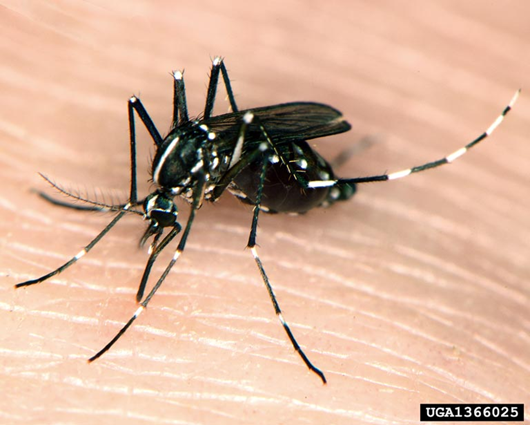Thursday, May 25, 2023
Helget is a certified master naturalist and past board member of the Arlington Regional Master Naturalists. She covered identifying these insects, their life cycles and roles in the environment and eco-friendly management responses. 
With global warming, tick season is lengthening in many areas, including the mid-Atlantic, studies show. Northern Virginia has six tick species, active from March to September.
What good are ticks? They are food for birds, reptiles and small mammals. “Opossums are tick vacuums,” she commented.
Ticks vary in size with some adults being about the size of a sesame seed and their larvae the size of a piece of pepper. The female lays from 3,000 and 18,000 eggs per clutch and they grow from egg to larva in leaf litter and ground vegetation.
Ticks do not fly or jump. They find food through a behavior that entomologists call “questing.” “They hang out and wait,” Helget said, waiting for a host to pass by. They seek a moist, quiet spot like between people’s toes or in the groin or armpit. “Ticks must eat blood at every stage to survive,” says the Center for Disease Control.
Some ticks carry Lyme disease and Rocky Mountain spotted fever, for example. They transmit pathogens by attaching to a host and injecting a pathogen. Some ticks do not carry diseases.
* Do tick checks on people and pets after being in wooded or leafy areas.
* Keep grass cut.
* Walk on trails.
* Wear light-colored clothing and tuck pant legs into socks.
* Put clothes in a hot dryer.
* If you have a tick, don’t squeeze it with tweezers or your fingers. “It could spit on you,” she said.
Yes, mosquitoes will bite people because they need protein, she explained, adding, “Males don’t bite.” As spring weather warms, adult females start looking for protein. She stressed, “Not every bite means a disease transmission,” but some mosquitoes can transmit diseases like West Nile virus.
Mosquitoes are important food for many animals like birds, frogs, bats, dragonflies and fish. They are pollinators that move from plant to plant and live two to three months. Virginia has around 60 species.
A female can lay 300 eggs at one time. They lay their eggs in stagnant water in places like saucers, gutters, ditches and storm drains. Some typical backyard mosquito “hangouts” are stagnant water from fountains, leaky hoses, bird baths, toys, pet bowls, clogged gutters and open trash bins. “They only need a bottle cap of water,” she noted.
* “The single best action is to eliminate sources of still water on your property where mosquitoes breed or treat the water with a mosquito larvicide like Mosquito Dunks,” advises Helget.
Other tips:
* Eliminate areas where they rest. “They love English ivy,” Helget said.
* Wear self-protective clothing, long sleeves, pants, socks, shoes and a head covering.
* Use skin repellents.
* Use fans. Mosquitoes are weak flyers.
* Avoid bug zappers. They kill all insects.
Spraying should be your last resort, she advised, and avoid spraying when pollinators are active. “Forego using sprays or foggers that contain non-selective pesticides like permethrin because they will kill pollinators and other beneficial insects along with mosquitoes,” said Helget.
If you hire a company, request integrated pest management. Be sure the company is licensed by the Virginia Department of Agriculture and Consumer Services (https://www.vdacs.virginia.gov/pesticides.shtml).
Sidebar
Insects and other invertebrates make up 94 percent of all animal species, according to the Xerces Society. The late Dr. E.O. Wilson called insects “the little things that run the world.” They pollinate plants, disperse seeds, provide food, recycle nutrients and decompose animal and plant matter. “Insects pollinate approximately 80 percent of the flowering plants in the mid-Atlantic region, reports the Audubon Field Guide to the Mid-Atlantic States.
University of Delaware entomologist Dr. Doug Tallamy has explained that without insects, food webs would collapse, plants would not be pollinated, animals would vanish and people would be left with bacteria and fungi.
“The creatures that keep us alive are disappearing,” Tallamy says. One-quarter of land-dwelling insects have disappeared in the past 30 years. The world is facing what some call the “insect apocalypse.” More than 40 percent of the world’s insect species face possible extinction, a 2019 study in Biological Conservation found.
And we know so little about insects. “Of an estimated three to 30 million insect species on the planet, only one million have been identified by scientists,” wrote Laura Tangley in a 2020 article.